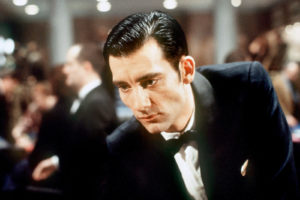DrunkenFist.com really started as a repository of my film writing. It features an almost complete archive of everything I’ve written on film since 1997.
If the scale of the archive seems intimidating and you don’t know where to begin, this page features some personal favorites for your reading pleasure.
The Royal Tenenbaums
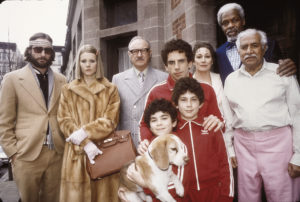
While it may not be "serious" enough to merit such raves from anyone but little old me, I have no problems saying The Royal Tenebaums is my favorite thing to come out of Hollywood this year.
Godfather I and II
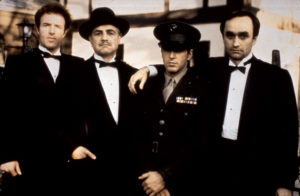
This isn't really much of a review as I think that it's pretty common knowledge that these films are great. Actually, the fact that they are user-rated #1 and #8 respectively at the Internet Movie Database is probably proof enough of that theory. So, unless you've been living under a rock for the last 28 years, you probably don't need some guy who was a few weeks away from birth when The Godfather was released telling you how good these movies are. What I am going to do instead is make a small suggestion about your plans for this weekend and then drop some anecdotal tidbits about these films that might heighten your viewing experience.
Requiem for a Dream
Requiem for a Dream, the second feature from director Darren Aronofsky, provides a rare synthesis of cinematic experimentation and emotionally compelling storytelling. It's a brilliant effort. Taking the potential glimpsed in the low- budget, high energy Pi, and marrying it to Selby's powerful tale of love, dreams and addiction, Requiem for a Dream provides a jolting, heartfelt journey into the depths of the human experience.
Police Story 2
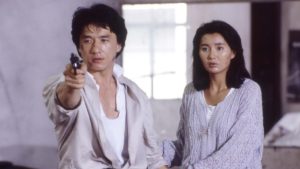
There’s a scene in Sammo Hung’s MILLIONAIRES EXPRESS, a rollicking heist/western/kung fu movie from 1986, that is a go-to when I discuss the stunt-work being done in Hong Kong in the 1980s.
In it, Yuen Biao, one of the stars of the film, does a front flip off of a burning three story building, landing on the ground below. It’s shot well back, so the whole building is in the frame throughout the shot. There’s nowhere to hide. There are no edits. No air mattresses or piles of cardboard boxes. It’s just Yuen jumping off of a burning building. It’s not the most dramatic or even the most dangerous stunt from the 1980s but it’s so honest it’s one of my favorites to talk about. It provides a clear illustration of the unique combination of skill, authenticity and institutional fearlessness that made 1980s Hong Kong stunt work unique in the history of cinema.
Drunken Master
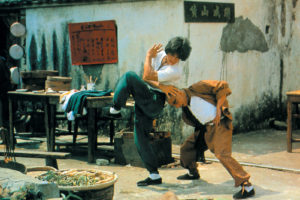
It might not look like it from the trailer or even after seeing the film, but DRUNKEN MASTER is a movie that has a surprising depth. Without context (imagine stumbling into a Chinatown theater in 1978) DRUNKEN MASTER is 90 minutes of goofy hijinks and mind-blowing martial arts action. Add in some context, however, and it also emerges as an important waypoint in the development of Hong Kong cinema. Which might be a bit of a surprise. It’s true, though. It really is. I swear.
Drunken Master 2 (Legend of the Drunken Master)
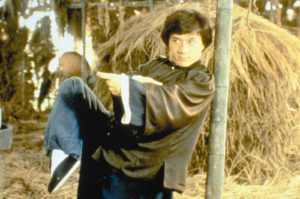
Back in the day the Hong Kong film industry moved quickly. If a film broke new ground with a novel take on a genre or ushered in a whole new sub-genre; the rest of the industry would rush in to cash in on the trend. Every film industry does this, of course, but Hong Kong in the 1980s and 1990s was producing so many movies, with such a high concentration of talent, the effect was mesmerizing. People were one-upping each other at every turn.
Kung Fu Movie Reviews; Various and Sundry
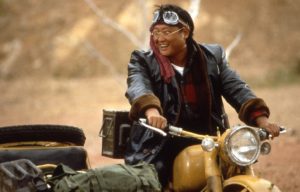
Recently, I've lived an odd existence. I'm either extremely busy and don't have time to shave, forget about enjoy myself, or I'm sitting around with enough time on my hands to build a scale model of the Titanic out of toothpicks. To fill those hours I've relied on a few old standby's and have been loving every minute of it. I've been reading again, I've finally gotten around to screening some of the films of Anime wunderkind Hayao Miyazaki, I played (and am still playing) the Blade Runner video game and, of course, I've watched a lot of movies. As you would expect, that pile of films featured a rather large proportion of the kung fu variety. Because of this I'm suffering from a sort of information overload and am going to have to release a little of it in this article. Therefore, there'll be absolutely no theme this month. None. Just reviews of varying length and clarity. Also, since there's no theme I'll be panning some stuff in the words that follow. That's history for this particular corner of the Shovel-verse. Anyway on to it then...
Waiting for Tak
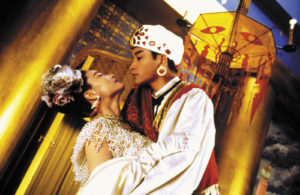
(The scene is best described as a bar. The reason for this is simple; it is one. Rob Larsen, dashing man about town and notorious rascal sits at the corner of the bar and carefully balances a silver dollar on the skinny end. After a few aborted attempts he succeeds. He smiles appreciatively at his handiwork and sips his beer. A Guy watches this and after a few moments, cautiously approaches. Carefully setting down his beer, so as not to disturb the silver dollar, he takes the empty stool next to our remarkably handsome hero. Rob turns.)
It’s 1978 and Three Directors Whip the Donkey’s Ass
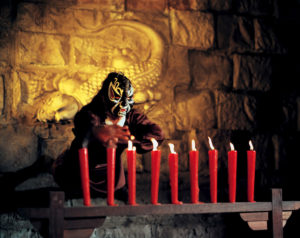
The finest year in the history of kung fu flicks? No doubt about it... 1978. Yep, while America was busy creeping out to Christopher Walken's Russian Roulette playing whack- job in The Deer Hunter and humming along to the goofball, whitebread, Middle- American pop garbage of Grease, Hong Kong was busy producing some of the finest films the genre has ever seen. Three in particular stand out as definitive classics, Jackie Chan's first mega-hit Drunken Master, Master Killer (36th Chamber of Shaolin, and the ultimate cult classic Five (Deadly) Venoms. All three are high watermarks for their respective directors, Yuen Wo-Ping, Lau Kar-Leung and Chang Cheh.
Capsule Reviews Are Good Clean Fun!
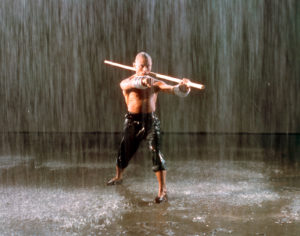
This month I'm sliding back into capsule review mode. Why? Well, (a) I've seen a lot of cool new stuff (b) I'm still in the middle of researching a (hopefully) pretty interesting "topic" article and (c) capsule reviews are good clean fun!
Crouching Tiger, Hidden Dragon
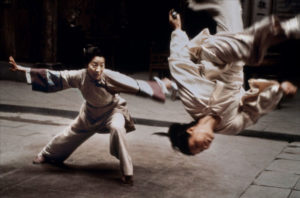
Ang Lee, the director responsible for films like The Ice Storm and Eat Drink Man Woman, here delivers a fascinating exploration of the traditional Chinese Wuxia Pian (film of martial chivalry.) With a blend of traditional elements and a modern attention to craft and character this film plays like a weird hybrid between the worlds of King Hu , Tsui Hark and Lee's own efforts. With an overalltone straight out of Hu's Dragon Gate Inn or Come Drink With Me, wild bursts of outrageous, fantastic action a' la Tsui's Once Upon a Time in China or Zu, Warrior from the Magic Mountain and Lee's own masterful appreciation of humanity. Crouching Tiger. represents a unique and welcomed achievement in genre cinema- a film that should satisfy both the genre fan and (because of its Academy blessed pedigree) the casual moviegoer.
If Life Were Only Like The Eagle Shooting Heroes
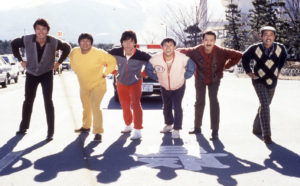
Well, this month in honor of writer's block I'm offering up a little kung fu movie stew. You see, when I woke this morning I looked at my reflection in the mirror and said, "your brains are turned to mush." I was actually just quoting one of my favorite lines from Goodfellas, but it was true nonetheless. My brains have turned to mush. I've fumbled around the past few weeks and have found that I am absolutely incapable of sustaining coherent writing for than a paragraph before hitting <Control A> and backspacing the whole thing into digital oblivion. When faced with a situation like this I figure a person has two options, (A) quit or (B) wing it. Being the trooper that I am I've chosen the latter and am feeling pretty damn dedicated about it. So, anyway, into the fray I go...
Rob Larsen for the Defense (of Wire Fu that is…)
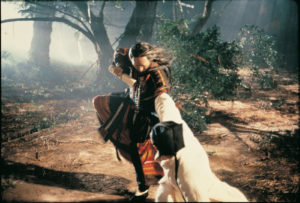
What does this have to do with Kung Fu movies, you ask? Well, I have just returned from two weeks in the very town in which the original Scopes" Monkey Trial" took place. A remarkable string of coincidences have merged to form an eerie parallel to the summer of 1925. It seems one Charlie Scopes (A remarkable coincidence considering that he is in no way related to John T. Scopes, the defendant in the "Monkey Trial") has gotten into a load of hot water with the local authorities. Scopes is the proprietor of a small "Art House" Cinema and as part of his weekly schedule he shows a kung fu film on Friday nights. Everything went smoothly for years until just last month when he showed a film featuring the talents of Boston's own Donnie Yen. The next day he was in jail. The film? Iron Monkey. The crime? "Passing off Wire- Fu as Kung- Fu." It's a ridiculous statute on the books in Tennessee. It was tacked on the back of a drunk- driving bill by an overzealous Jackie Chan fan who just happens to be a member of their House of Representatives. Since my adoration of wuxia pian (the Chinese name for super- powered kung fu films) is well documented, I was immediately summoned to take part in his defense. Since I was the only person who showed up on his behalf I was forced into serving as his attorney. The following is my closing summation from the soon- to- be infamous Scopes "Iron Monkey" Trial.
Gwoemul 괴물 (The Host)
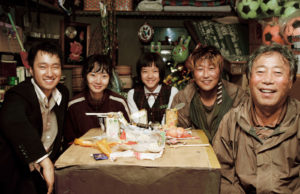
Imagine, if you will, Wes Anderson and Ridley Scott getting together to make a monster movie. That's the Host. It's really like they took all of the quirky character bits from Rushmore or The Royal Tenenbaums and mashed it up with Alien and tossed it into the middle of Seoul. The monster bits should be pretty obvious as one peek at the creature will tell you it's very Alien-like, the Wes Andersonisms are maybe a little less apparent but for me it was an almost immediate connection.
Tokyo Drifter: Subversion from the Inside Out
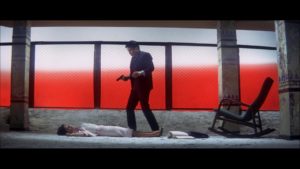
Suzuki was under contract with Nikkatsu in the 1960s; there to crank out genre pictures at a good clip to help fill out the studio’s slate. The thing is, his vision was such that he was consistently delivering much more than the standard genre fare the studio expected. His output during this period, in films like Gates of Flesh and Youth of the Beast, is full of unexpected, surprising moments and is marked by constant experimentation with everything- sets, story, editing, color and staging.
While this work had some commercial and critical success, the studio was increasingly uncomfortable with Suzuki’s films. They were just too weird. To be fair, most of his films would be weird to modern eyes. They tried to rein him in. For his next picture, they wanted something a little less on the edge.
The film that came out of this situation was Tokyo Drifter and, thankfully for us, Suzuki couldn’t be constrained by the suits at the studio. At some basic level he complied by their wishes. The plot is simple and moves from A to B in a brisk hour and twenty minutes. A gangster, Tetsuya (played by pop star, Tetsuya Watari) tries to go straight alongside his boss and they’re undermined by a rival. He ends up on the run and then returns to revenge himself against those who have wronged him. There are gunfights galore. If you squint, it’s like he was toeing the line. This has the general shape of a gangster picture.
Ran
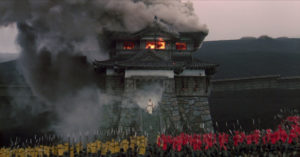
Before I get underway here, I just thought I should mention that Kurosawa was nominated as Best Director for this film and lost to Sydney Pollack. Pollack's film? Out of Africa. Y'know, something about that fills me with an infinite sense of "wrongness." For me, coming upon that fact is like walking into a room and seeing all the furniture on the ceiling. It's just not right.
